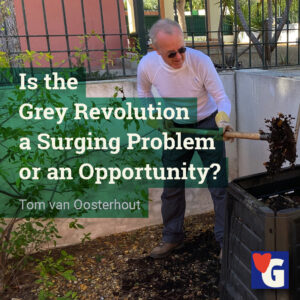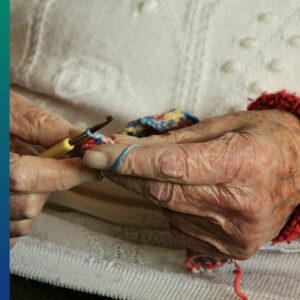
The Grey Revolution is a two-pronged revolution. From the 19th century onwards our longevity doubled. At the same time, fewer and fewer children are born. The graying and greening of society coincide.
Employers prefer young people because they seem to be cheaper. In the queue for the supermarket checkout, it is ‘always’ those oldies who cause delays. Prejudice is easy and abundantly present.
Like most revolutions, this ‘grey’ one has a tremendous impact on societies. Despite popular views, these impacts are predominantly positive. This needs some explaining.
Table of contents
First some statistics

According to the United Nations (UN) in 2019 the population of 65 and over is 9% of the total population. In 2050 this will be 16%. However, there are huge differences between countries. For instance in Spain, the amount of people of 65 and over of the total population is already 19%, and in Japan 25%.
For Japan, the World Health Organization (WHO) estimates that in the peak year, 2055, this percentage will have risen to 42%. Spain is second with 40%.
But there are more striking differences. In 2013 of the people in Japan of 65 and over 27,5% participated in the labor force, compared to 2,8% of the men in France.
Moreover, in Spain, the participation of people of 55 years and over in the labor force is only 53%. This is the lowest percentage of the countries in the developed world.
Immense opportunities
It’s obvious that in many countries the economy is graying. In 2025 the grey economy in the EU will contribute 32% to the GNI, Gross National Income, and 38% to employment (+88 million jobs compared to 2015). The higher the pensions, the higher the economic impact will be, particularly on the domestic economy.
The silver economy develops in two directions. One offers products and services related to leisure, entertainment, and active aging. The other aims at people with poorer health that require care and cure. Researchers stipulate that all economic sectors involved will profit.
Related: The Importance of Life Expectancy for your Unique Personal Situation
The Grey Revolution comes with a price

The economic opportunities presented above will only emerge when the working life is expanded. This is the most important price people will have to pay because of the greying population. Countries such as France, Spain, and Portugal will really have to make an effort to accomplish longer working lives.
However, the benefits will be substantial. If 75% of the people between 55 and 65 would work, as in New Zealand, the Spanish GNI would increase by at least 15%. The protests and strikes in France in 2019 demonstrate that the road to longer working lives is paved with many political difficulties.
Politicians and policymakers created most of these difficulties themselves. During periods of economic downwind many older employees were, with taxpayers’ money, either forced or allured out of the workplace. Early retirement became the rule instead of the exception.
To work is one of the basics of the Grey Revolution
No matter how important longer working lives are, more is required to accomplish the Grey Revolution. The political, social, and entrepreneurial mindsets will have to change substantially. Discrimination of the elderly is a common feat in every economic sector and on every societal level.
There is one striking example of legal and political discrimination against the elderly at the workplace. That is the possibility to dismiss someone from his or her job when reaching a certain age. This possibility has even been approved by the European Court of Justice. This legal discrimination must be undone quickly.
One of the basics of the Grey Revolution is social participation. People who work usually think that retirement comes with social participation perks such as volunteering and more possibilities for social life in the family. However, what they tend to forget is that paid work is an even better opportunity for social participation.
Quit when you want to

A friend of Hannie loved her job, which she had been doing for 44 years. The staff of her organization had already tried several times to retire her prematurely. Strangely enough, at that time the Dutch government was actually trying to raise the retirement age.
Two contradictory actions, one from the employers and the opposite from the government, both not interested in the arguments of the other. And both are absolutely not interested in the arguments of the employees.
I think that this is one of the most striking issues for older employees: neither the government nor the employers are interested in the concerns of the older employees. At every conceivable opportunity, employees are ignored and degraded to an insignificant entity.
Covert obesity
Besides, a longer working life, another important basis of the Grey Revolution is good health. Fortunately most elderly between 65 and 75 can boast of good health. Yet there is room for some concern. Obesity and stress are two ailments that in the medium run are assumed to jeopardize this fortune.
The elderly do not always become obese because they eat too fat, too sweet, and too salty. Nor do most of them drink too much alcohol. The problem is that if you grow older, your body shrinks. Not much, but enough to make space for more subcutaneous fats. This type of obesity does hardly show on the outside.
This means that when we don’t restrict ourselves in our food habits when we grow older, the risk of serious and often lethal impairments will increase. And we will not even be aware of these silent killers.
Solution for longevity
To sustain a longer life in good health, and thereby growing older in a pleasant way, it is sensible to eat less than we were used to when we were still at work.
Intermittent fasting seems to work best for us. We eat a good breakfast and lunch and skip dinner. Hannie is even stricter than I am, she doesn’t eat anything after 5 pm. I occasionally grab some nuts in the evening.
Of course, exercise and good social company are also very important. The more you can rely on others, and others can rely on you, the happier all parties will be.
The Grey Revolution is a collective performance
A healthy but sober diet is not enough. You also need to exercise. This is something people usually forget when they’re at their job or when they volunteer. And many modern (voluntary) jobs are sedative jobs.
People sit behind a desk, behind a computer, in a conference room, or in their car. There’s no sedative job where you have mandatory exercise every hour. Or where they have the means to exercise during working hours. But for an aging workforce, these are essential conditions.
This is why, as stated before, a huge change of mindset is required. Not only the elderly have to change theirs, but also the employees and the politicians. The Grey Revolution is a collective performance.
Did you retire early or worked until the required retirement age? Tell us in the comment box below.
Our recommendation to achieve financial freedom:
Our websites aim at helping you in the areas of Health, Sustainability, Mindful Living and Having Fun.
In May 2020 we started to learn about Affiliate Marketing. Apart from having a good time working on our websites, we now also make money from them. You can do that too.


I didn’t know that this was called the Grey Revolution. I read somewhere that the percentage of elderly is indeed increasing and people are having fewer children (in mostly first world countries). Some people I know have told me about cases where they were discriminated due to their age, and I once also observed a young cashier, barely in her twenties, telling off an older man who was packing groceries there for extra money (pensions in Mexico are not great). He just stood there and took it, she was so rude to him. I couldn’t believe it.
A few years ago, an elderly woman at my workplace was laid off (because of her age ..). even though she wanted to continue working. She cried on her last day, it was heartbreaking … Her children are taking care of her, I think.
Hi Christine,
What’s in a name? Somebody made it up. The Grey Revolution. I think it ain’t a revolution until the elderly made something out of this opportunity. That of course remains to be seen. Only future historians will be able to judge our time.
By the way, the greening of society is a worldwide phenomenon. Pharmaceutical industries have discovered long ago that you can earn money in the ‘third world’ as well.
It’s the same with secularization. That’s a worldwide phenomenon because more people than ever own a TV, a computer, and, most important and widespread as anything, a mobile phone. Everybody is on the internet. Take it from me, the gospel is not the type of information most people are interested in.
Not too long ago I saw a documentary about slums in Africa. Millions and millions of young people leave the countryside to try to find a job in the cities. About three-quarters of them actually do find a job. Although there is enough money in Africa to invest in the development of houses, there are often not enough building materials, the infrastructure is poor, and there are too few construction workers. Actually, you must conclude that the pace of development in Africa can’t keep up with the pace of urbanization. This is why slums emerge and grow so quickly.
What amazed me most in the documentary was a young woman (I guess her age was 18 or 19) who complained about the fact that they had no proper toilet at home. She had to go to the river, like most people, to sit and do her no. 1 and 2 things over there. This made me feel ashamed. Until I heard a strange noise again and again. Apparently, she got annoyed with the noise. Her hand went to the back of her pants and out came the latest i-phone. Somebody was calling her. This made me wonder whether she had her priorities right. I don’t think so.
However, the combined greying and greening of society is a huge problem. Moreover, because most women have to work to make ends meet, informal care of the elderly, as well as the children, of course, is declining rapidly. And there are no alternatives.
Age discrimination is rampant. In Europe, it’s even legally condoned. In other countries, it will not be any better. I’m afraid this will not change in the near future. Unless people get more opportunities to work as long as they like.
Thank you for your comment.
For now, stay safe, stay healthy.
Regards,
Tom
I am still working, but I know many people who would like to retire, but they can’t afford that. Pensions are too small to continue with a “normal” life.
I think that the biggest problem is the overall pension system in every country. We pay taxes and pension savings throughout the whole life, but those pension savings end up somewhere else, and when we retire, they don’t pay pensions from pension funds. They pay us from taxpayers, which leads every country to debt, especially with the population becoming older and older.
Do you think that in the future, it’ll be important to make private pension savings to live a worry-free life once we retire?
Hi again Petar,
We live from a state pension and pensions from work and private pensions we saved ourselves. This means that we have several sources of income. We both still work. I’m connected to a University in The Netherlands. Hannie works on different Internet projects.
One of the research projects I worked on was about retirement. Although there is no discussion about the fact that you need sufficient funds to be able to retire, for most elderly in The Netherlands the money is not a problem. Provided you lived all your life there from age 15 or paid an insurance fee to the state during the years you stayed in another country. Yes, the rules for entitlement of a state pension are not easy.
However, you can only live a proper life in The Netherlands after retirement when you have secured the types of income just as we have. This is the answer to your question: to provide for a worry-free retirement it’s best to combine a state, a work, and a private pension. And this is not in the future, this is something that you should start with from today. When possible.
If you learn anything studying retirement, it is that the pension systems are different in every country. Moreover, governments regularly change the rules of these systems. As we’ve experienced too often ourselves. And indeed, as you noticed, sometimes use the pension money for other purposes.
The biggest problem for most pensioners is however how they’re going to spend their time after retirement. You can never start young enough to think about what that might mean for you personally.
Thank you again for your comment.
For now, stay safe, stay healthy.
Regards,
Tom